#deductionist
Text
Algae and Forensics
If you watch a lot of crime shows, you may have seen algae being used to help solve a crime. In Dexter, the algae on the victims was used to determine the port they came from, which led them to Dexter. Or Hannibal, where the algae led the FBI to Miriam Lass. A lot of crime shows play forensics up, but algae actually can be an important tool for helping solve a crime.
The presence of algae, or lack thereof, can tell us several things. Is there algae present in the closed organs of the decedent? If so, that tells you they were drowned or whether or not they were taken to a second location. What kind of algae? This can help us determine fairly accurately where the victim was drowned. This doesn't include bathwater or water with too few diatoms, such as ice water.
But how? Let's look into that.

First off, I will be using the term "Diatoms." If you are unaware, diatoms are a type of photosynthesising algae, so I will be using the terms interchangeably.
There are over 15,000 species of algae living in brackish, fresh water, and sea water. Ponds, lakes, rivers, oceans, and coastal areas all have different diatom communities, and using that we can identify where the victim might have been killed.
When you drown, liquid is aspirated into the lungs and enters the bloodstream through alveoli. This lets particles such as sediments, microorganisms, or pollen to be carried to organs and deposited in capillaries. This means that diatoms can be found in the organs of a drown victim.
So, if diatoms are found in distant organs or closed systems and are of a great abundance, the cause of death is most likely due to ante-mortem drowning. This lets us know that the victim was drowned and was not just dumped posthumously.
Thanks to diatoms acid resistant sillica shell, they can easily be separated from tissue using acid-digestive extractions, and they are detectable in burned or putrified corpses. This means that drowning as a cause of death could be determined in a burnt victim that was taken to a second location.
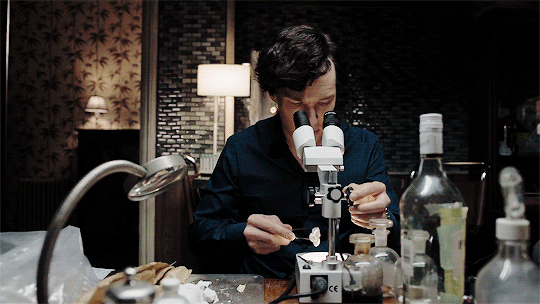
Algae is also being researched for its use as a time of death indicator. A study was conducted by forensic scientists, who found the diversity of algae on piglet bodies in water tended to decrease over time with a peak in diatoms recorded after 1-8 days of decomposition. This kind of work remains largely experimental, but it has the potential to be used for establishing a timeline since death (or submersion) in water.
Algae can be useful for linking criminals to their crime scenes, as diatoms can transfer onto clothing or footwear. Comparing microflora with the diatoms found could also give you a general area or type of water they were drowned in, as a swamp would have different algae than say, the ocean.
This evidence isn't damning in and of itself, but all evidence at a crime scene is valuable for solving the crime, and as such, algae can be an important part of forensics.
Thanks for reading! Have a good day and a cup of tea :)
#forensics#dexter#sherlock#forensic science#mortuary science#algae#my favorite thing in the whole world is the intersection of forensics and marine biology#marine biology#biology#marine flora#✨️science✨️#djxbbdshhshsn#im tired as fuck#not that anyone asked#:>#criminologist#criminology#crime#crime solving#with ✨️forensics ✨️#woo#sherlockian#deduction#science of deduction#deductionist#deductive reasoning#marine biologist#marine life#microflora
62 notes
·
View notes
Text
Deduction Tips #16
The size of a bag is indicative of how much a person needs to carry, and usually we prefer to carry less things. When you see someone with a bag (be it a backpack, a purse, or anything else) think about why this person needs a bigger one rather than a smaller one, and what that says about the contents of the bag and the situation of the person carrying it
#deduce#learning deduction#deductionist#deductive reasoning#deduction#sherlock#logic reasoning#observant#observation#profiling#psychology#logic#sherlock holmes#bbc sherlock#sherlock bbc#Sherlockian Deduction#How to think like Sherlock Holmes#study#studyblr#learning#tips#memory#mind palace#microexpressions#criminal minds#the mentalist#house md#elementary#body language
43 notes
·
View notes
Text
Observation 101
So, here we are. If you practiced your Mindset and Intuition, observation will be more useful for you. Obviously, in 1 post we can only discuss what is observation and how to observe better. In the future, we will go deeper and analyze scenes. For now, let's get started.

Some people think that observation is just looking around. But here is the difference: Looking around is passive, observation is active. There is something called "Passive Observation" but it is not the same as looking around.
Passive Observation: It is an automatic habit you develop. You don't actively look for details but you observe. For example, you shake someone's hand and later you can say it was a firm grip and he wore a watch even though you weren't paying attention. Obviously, details come with attention so you won't observe a lot passively.
Active Observation: You have a purpose and you channel your observation with this purpose. You want to observe as much as possible in the shortest amount of time. So, when you shake hands you don't just shake, you are trying to get a feel of his skin, you are looking for the brand of the watch etc. When you become active, more details are available to you.

Let's analyze this scene in a very superficial way. Sherlock listens to the victim's parents and while he turns his head, he notices something. He realizes that an object is not where it is supposed to be. It is just an instant intuition and passive observation. It appears he wasn't actively looking but still noticed it because he practiced observation for a long time and he can observe even when he doesn't give attention.
Obviously, we have a lot of examples of active observation so I won't go deep on that.(Basically, every scene where Sherlock makes a deduction is almost an active observation. Though, we will go deeper in the next posts.)We can't do anything about passive observation because it will come with practice. For now, let's focus on active observation.
How to Observe?
Even if you know what to look for, if you don't know how to look, it won't matter. (You will look for a watch on a man's wrist but miss the detail that it is a woman's watch. )
So, for the last 3 years, I did research about how to observe and still @amateur-deductions program is one of the best programs. 2 basic questions will increase your observation skills immensely. Those are:
1-What is missing?
This question is important because like the example above(Sherlock notices what is missing, which is bust)you need to see what is not there but should be. Almost everyone buys dumbells as a pair. So, if you see a 5 kg dumbell on the ground, you should question where is the other one.(If there is another one.) If you ask yourself "What is missing?" you will see it easier.
2-What seems out of place?
You see a soldier but he is not shaved. Why? Maybe he left the military or he is lying. Whatever the case, there is something out of place and by asking "What seems out of place?" you will look for odd details.
These 2 questions are not enough but very important for the foundation. In addition, never forget: “There is nothing more deceptive than an obvious fact.” Never take anything for granted.
Your brain will trick you when there is an obvious fact like that:
Wrong: This person wears a watch. A lot of people wear a watch so it is not important. I don't have to observe it.
True: I wonder what can I observe about this watch? What time does it show?
What to look for?
The answer to that question is simple: Everything. You can't take the risk of missing any details so you have to observe everything. After you observe everything, your observations will draw you a path and you will go deeper into some of them. So, observe everything.
This is a long introduction but a necessary one. In the future, we will go deeper. So, if you have any questions about observation, send them. For now, that's all. See you later.
#deduction#sherlock holmes#bbc sherlock#deductive reasoning#sherlockbbc#sherlock#art#deductionist#awareness#observer#just an observation#elementary sherlock#cbs elementary#joan watson
25 notes
·
View notes
Text
Visualizing the Building Theory using BBC Sherlock
@amateur-deductions recently did a post on the Building Theory. In his words:
[The Building Theory] serves as a wonderful way to illustrate how much a deduction is a progressive process, with multiple little steps between observations and conclusions. It's also an amazing tool to analyze other people's deductions and break them down in a way that allows you to map out their trains of thought and learn from them
He provides an excellent explanation of how the theory works: basically, you think of the process of deducing as constructing a building, with observations and subsequent deductions representing bricks that are stacked on top of one another, building up to more complex deductions based on those original observations & deductions.
I’ve always liked this theory because it makes the process of deduction more tangible and visual, which helps me learn, and I know others like to use visuals to learn too.
I’ve mapped out deductions from BBC Sherlock before, so I thought sharing that here would help provide a visual supplement to @amateur-deductions‘ work.
When Sherlock and John first meet, Sherlock asks: “Afghanistan or Iraq?”
You can watch the scene where he asks that here. And the scene where he explains how he got to that here.
While the show provides a decent verbal breakdown of how Sherlock got to that question, we can also visualize his process like this:
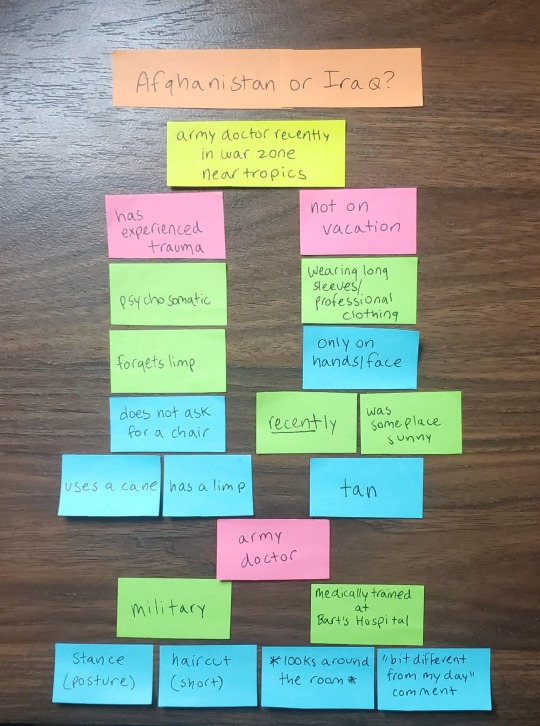
blue: observations // green: deductions made from observations // pink: deductions made from prior deductions & observations (level 1) // yellow: deductions made from prior deductions (level 2)
As you can see, Sherlock uses his initial observations about John to make deductions, and then uses those deductions to make additional deductions. All of this culminates in him asking John “Afghanistan or Iraq?”
Let’s break down this process a bit. We can think of this building as being made up of a bottom floor, and then two supporting sides that work together to build onto that bottom floor and also support the roof placed on top.
First, the bottom floor:
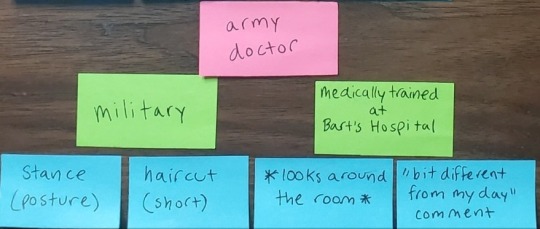
When John enters the room, Sherlock looks up at him and makes four observations about him, which he uses to make two deductions.
1. stance + haircut = military
** Sherlock knows that these observations = military from knowledge he has about the appearance/behavior of people in the military.
2. looks around the room + says “bit different from my day” = medically trained at Bart’s Hospital
** Here Sherlock uses a combination of knowledge and logic. He knows that Bart’s Hospital is a well-known training hospital and if John is familiar with the lab that the pair are standing in (as opposed to a patient room), he must have been a student there.
Sherlock then takes those two deductions and combines them to create another: military + medically trained = army doctor. That deduction forms the base of the rest of the building.
Next, there are two supporting sides. Let’s call them the “limp” side and “tan” side, as those are the two observations that form the base of each.
First, the limp:
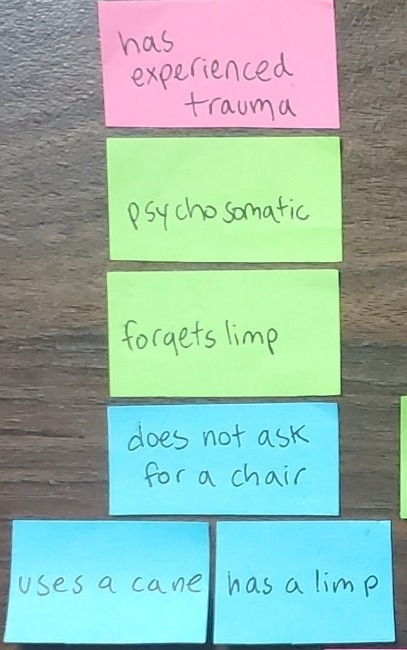
Sherlock begins with several observations:
1. has a limp and uses a cane.
2. does not ask for a chair to sit in.
** Knowledge: Sherlock knows that people with limps may look for or ask for somewhere to sit.
From this, Sherlock deduces that John:
1. forgets he has the limp.
2. Why? Because the limp is psychosomatic.
** Knowledge: Sherlock knows about psychosomatic injuries.
3. Which means that trauma caused the limp.
Second, the tan:

Again, Sherlock begins with two observations, and each have their own subsequent deduction.
1. has a tan. = was recently in a sunny place.
** Knowledge: Sherlock knows that people get a tan from being in the sun, and that tans fade over time.
2. only has a tan on his hands and face. = was in a sunny place while wearing long sleeves, so he was not on vacation or sunbathing, but was on business.
** Knowledge: Sherlock knows that when people go on vacation to a sunny location, it is not typical to wear long sleeves or professional clothing but rather dress casual (shorts and a t-shirt, swimsuits, etc.).
Here is where Sherlock’s process culminates into the question. Relying on the deduction that John is an army doctor, and combining that deduction with these two new deductions (1) has a limp from trauma, and (2) was recently in a sunny place for business/work, Sherlock makes this final deduction: John is an army doctor who was recently in a war zone near the tropics.
He cannot go further than this though, as there are a few locations that fit that description. So, Sherlock engages in order to get the information he needs: “Afghanistan or Iraq?”
~
I hope this provided a helpful visual example of the Building Theory - if anybody has any questions or wants me to go into more detail on any aspect of this example, please ask!
69 notes
·
View notes
Note
When it comes to the observation weeks in the training program. Could you elaborate on why we shouldn’t deduce then? Is it only about the time when we are doing the exercises?
Hello! great question, i gotta say i didn't write that program, but i did follow it, so i can only give you an answer based on my experience with it and with deduction as a whole. Unfortunately L isn't available to give you the original reason, but if i get in contact with them i'll make a post with their answer.
So, there's this quote from Sherlock which sums up the reasoning behind this very clearly:
"It is a capital mistake to theorize before one has data. Insensibly one begins to twist facts to suit theories, instead of theories to suit facts."
During this stage of the program it is assumed you're coming into deduction as a complete beginner, and therefore that you haven't honed your observation skills yet. This means you'll inevitably be at a point where if you try to deduce you'll be doing so while missing a large amount of information, and fall into the trap of not knowing you're missing information and trying to work with what you have, which leads to often taking big leaps in reasoning to reach conclusions, because you don't have enough data to work with.
This is also why when i teach people i make sure they're at an acceptable level in their observation skills before i move onto other stuff. Later on in the process you learn how to make the most out of a situation where you have little to no information to deduce from. But that's a bit too complicated for a beginner, so it's important that they don't try to deduce until they have a solid grasp on what information they can gather
Aditionally, the training program, as incomplete as it may be, attempts to separate the process of learning deduction into manageable chunks. That program was written during a time where the community was much bigger and everyone attempting to find some way of learning this skill. Everyone was coming up with solutions to their problems and sharing them in the community, and that program is an attempt to solve the overwhelming feeling that comes with trying to learn a massive skill with multiple possible points of entry. It segments it into manageable, organized chunks for people to have a neat way of getting started with deduction, and one of those chunks is just observation, since it's complex enough of a base skill to have its own section
#deduce#learning deduction#deductionist#deductive reasoning#deduction#sherlock#logic reasoning#observant#observation#profiling#psychology#logic#sherlock holmes#bbc sherlock#sherlock bbc#Sherlockian Deduction#How to think like Sherlock Holmes#study#studyblr#learning#tips#memory#mind palace#microexpressions#criminal minds#the mentalist#house md#elementary#body language#answers
13 notes
·
View notes
Note
you haven't posted anything in a while, you ok?
I'm alright, just quite busy.
#busy#deductionist#deduction#tumblr#deducter#deduce#deductive reasoning#science of deduction#tumblrpost#q&a#bored#observant
11 notes
·
View notes
Text
The presence of mind
In the span of 4, almost 5 months since I started deduction, I haven't seen anyone talk about the presence of mind (PoM).
PoM is important for a good detective in my opinion,
It separates you from all the NPC that do what they are programmed to do, a straight line.
A detective sees nuances in life, something out of place, something missing out.
And these are not something you look for, can't spend all day watching people, watching for clues.
Physically impossible,
Arguably a waste of time.
Presence of mind means you know what's normal, and your "spider sense" tingles when something is wrong.
That's when you start looking for clues.
Seemingly an effortless and effective.
The question now is how.
2 notes
·
View notes
Text
Second post in like 2 minutes but yk what’s fascinating? Mind hunter
Like genuinely. If I hadn’t watched that show I never would’ve thought about criminals in a different mindset. I mean, the way that we see them as nothing more than just a criminal. But if you look inside their mind, figure out why, understand their background and their identity and the motive makes so much more sense than the information you would’ve gained without it.
Put it this way. A female murderer who targets young boys and nurses because the baby boys she tried to have were murdered during their births sounds a lot more appealing than me just saying a female that murders young boys and nurses, understanding the reason why gives you more insight and helps you to empathise with your criminal. I know that during the time someone would be trying to find a killer it probably wouldn’t help, but thinking this way can narrow it down Yk? Hehe
#science of deduction#deduction#deductionist#mind hunter#why did they have to cancel it#it was so good
1 note
·
View note
Text
A New Deductionist Paradigm

Sherlock Holmes and his successors are contentious points of discussion among fans seeking more than fiction. Mysteries provide thought provoking entertainment and a feeling of reassurance for nearly all who consume the genre; however, for a few it is not enough to simply consume the media presented. This uncontent viewer needs to become the superhero (or fabled detective). Unlike other kinds of fiction — as if to put gasoline on the proverbial fire — these superpowers seem tangible. Holmes may be fictional but surely his prowess can be learned. Whether it’s due to the “follow along format” of mystery or a personality trait of the viewer, there exists a cult following restlessly honing their craft of logic and deduction.
Many of these fans — which we will call “Deductionists’” — have taught themselves formal logic from a pastiche of well documented media analysis, criminology and forensic information available online, mentalist television performers, and an ever growing pool of arbitrary facts called a knowledge base. The unfortunate side effect of this inevitable approach is the deductionist gathers and processes new information through the lens of a writer, therefore producing something adjacent to fiction. On top of this complexity — which is an equally long and chaotic experience for most new deductionists — disagreements within the community creates divisions along the axis of “stage performances” versus “real deduction” separating further into Mentalists and Holmesians; which in all honesty is not always a helpful distinction. This can be uniquely difficult to sort through as a new member of the community.
However, the purpose of this blog is not to document the complexities of self driven education; it is to demystify and simplify the entire process. Deductionists' of the internet age memorize situations and series of circumstances as if drilling events in a martial art. Unfortunately they do not understand the core principles of the art they drill for, therefore learning entire swaths of information that may have been avoided altogether. The deductionist asks themselves "What does the discoloration of the fingernail mean?" but do not ask the more important and topical question "What is deduction?".
I present a new deductionist paradigm. A full knowledge base on deduction organized into one map without the situational complexities. This blog is a re-packaging of all the information I have taught myself over the past years. I will post everything I know about Holmesian deduction in the form of written lectures as if you were attending a university. After each lecture I will answer topical in a singular post. There are a few more overview posts I need to get out of the way (which I highly suggest you do not skip) and then we will go directly into the meat of deduction, beginning with formal logic.
-CM
17 notes
·
View notes
Text
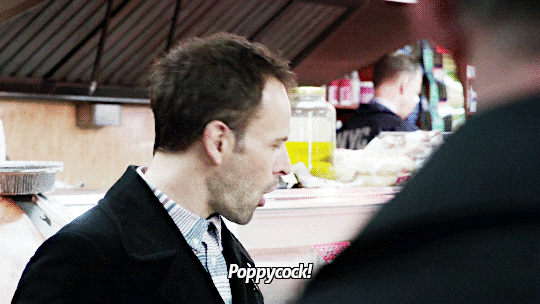




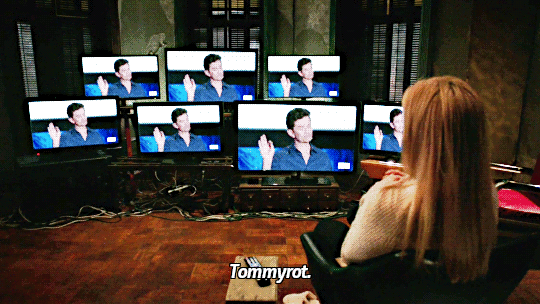
#elementaryedit#elementasquee#*elementary#elementary#the deductionist#possibility two#the man with the twisted lip#art in the blood#bella#into the woods
588 notes
·
View notes
Photo
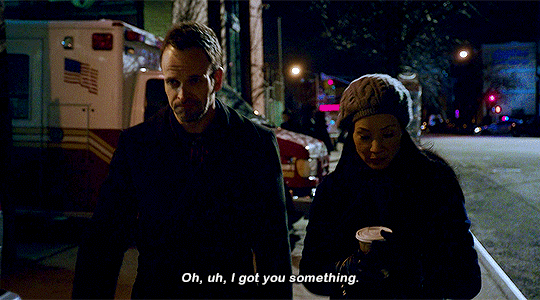
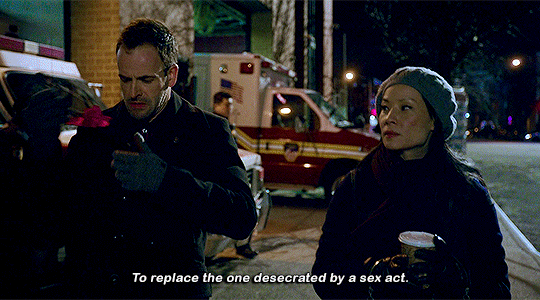

If I were you, I wouldn't be upset that a dirty movie was produced in my home; I would be upset that it was produced so sloppily. And if you haven't already, I strongly recommend that you find yourself a new spatula.
#elementary#elementaryedit#elementasquee#rjs*: new#joan watson#sherlock holmes#brotp: you and i are bound#ele s1#the deductionist#plz a classic :')
280 notes
·
View notes
Text
Deductions are cool.
As someone who's learning the science of deduction, it feels like how I imagine it would be like to not know how to read. A world of signs, of letters and words forming information if you just knew how to decode it. Learning to make deductions feels like finally learning to read, finally really seeing everything around you and connecting it to things to get information.
It's like learning a new language, one that's everywhere, all the time, just ready for you to notice. There's so much to be gained from that language, I think it's beautiful, and I'm happy to have one more way to quench the thirst for knowledge.
#bro life is so cool#like#its just so fantastic#theres so much knowledge out there#and with deductions i can have even MORE knowledge#positively scrumptious#deduction#deductive reasoning#sherlock#science of deduction#deductions#deductionist#im so happy to be alive sometimes#dndbdbsjjsznd lifes fantastic#superb even#the high of knowledge and chocolate milk is getting to me
21 notes
·
View notes
Note
Hi!!! How can deductions be used in day to day life, or like, usefully? And how have you made useful deductions? Sorry if that made little sense
Hi! I see you sent this question in the past two days, i'll gladly answer it, but in case you send any other questions in the future and i don't answer them as quickly i'll inform you that usually all the questions of the week are collected in my inbox and you'd get your answer on a Monday (this week i had some scheduling problems so i pushed it to Wednesday), so if you don't get as quick an answer next time just wait for Monday!
Now, regarding your question! There's many ways deduction can be used in daily life, sometimes it even depends on what you do for a living. For example i know psychologists and other healthcare profesionals have to rely on non verbal communication and information they gather from observation, along with what they're told, since patients can't be relied upon to be transparent and honest all the time, or even know what information is releant to share. In this case deduction can be massively useful.
On a more general note, it depends a lot on the type of relationships you have, i know people who use deduction to interact with their friends, it allows them to know when they're feeling upset or worried, and about what, and act accordingly, all without needing to do more than just glance at them. I know people who use deduction to navigate social situations because they're not good at interacting with people and having the extra information deduction provides helps. Personally i'm someone that introduces deduction into everything i do, from acquiring helpful knowledge when talking to superiors, to knowing what waiter is best to call over at my table cause they've gotten more hours of sleep.
I recommend you watch Sherlock, House M.D., The Mentalist, and all of these deduction heavy shows that sometimes showcase how these characters use their skills casually, it's really not much different than what you see there. If you want a blog that really goes into casual uses of dedduction i'd check out @froogboi 's blog, it's full of everyday life uses of deduction
#deduce#learning deduction#deductionist#deductive reasoning#deduction#sherlock#logic reasoning#observant#observation#profiling#psychology#logic#sherlock holmes#bbc sherlock#sherlock bbc#Sherlockian Deduction#How to think like Sherlock Holmes#study#studyblr#learning#tips#memory#mind palace#microexpressions#criminal minds#the mentalist#house md#elementary#body language#answers
22 notes
·
View notes
Text
Stoic Perspective
This post will be some kind of addition to mindset, but also very important part. You might be wondering how it is related to deduction and Sherlock Holmes but even though we don't see Sherlock talking about Stoicism, he follows it in most cases. (Mixed with Cynicism which started around the time Diogenes lived.) So, let's see how Sherlock uses and how we can use it in our daily life.

Remember this episode? Season 1 Episode 3. Sherlock solves 5 cases in a row with some time constraints, stress factors, etc. In one scene, Watson asks, "There are lives at stake Sherlock! Actual human lives. Just so I know, do you care about that all?" and Sherlock answers with a brilliant answer: "Will caring about them help save them?" and Watson says "Nope." and then Sherlock says "Then I will continue not to make that mistake." Obviously, they show it like Sherlock doesn't care about anyone and is an egocentric narcissistic robot but that is certainly not the case. If you watch other adaptations(Granada, Elementary or even the books)Sherlock cares about other people, but not in a way normal people do. I am pointing out this scene because it shows us the attitude and mindset of Sherlock. Let's see how we can apply this in real life:
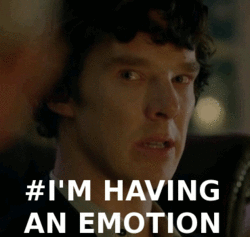
1-Caring without Emotions
"Emotional qualities are antagonistic to clear reasoning."
-Sherlock Holmes
After watching Sherlock we shouldn't try to be like Sherlock, especially if we don't understand how he thinks. When he says, caring won't save them it doesn't mean he doesn't care. It just means it is not relevant and emotions won't help them in any way because it will cloud his thinking and deductions. So, what can you do in situations where stress is high and your emotions come to the surface?

1-Recognize them: Don't suppress or act like you don't have them. Just realize they are there and act accordingly. If you say "There is nothing wrong with me. I don't feel any emotions right now..." then you won't be aware of the affect they have on you.
2-Think Clearly: It is easy to say but hard to do. How can we think clearly? What does it mean? It means you have to use the relevant data and eliminate what is not. If you want to think clearly, you have to recognize your feelings, emotions etc. You have to be aware of them at every step so that when they are affecting your reasoning, you can overcome them and keep going.
3-Follow Your Logic
Sherlock doesn't call Moriarty after he solves the case because he wants to use time advantage. He wants to work on other cases and because of that, he doesn't call Moriarty. Watson is reacting with emotions and says this woman was covered with bombs all this time. Although Sherlock cares about the woman, he follows the logic. If he uses the time to his advantage, he can save more than one life but if he reacts with emotions, he will just save one. So, use your logic and act accordingly.
2-Perspective For Problems
"External things are not the problem. It's your assessment of them. Which you can erase right now."
-Marcus Aurelius
This can change a lot of things about how you see your problems. Let's say you have a lot of work to do and after a long day you are going home. When you arrive there, you realize your house is on fire? How would you react?
I believe, most of us would be full of emotions. Why did this happen to me? Why is life not fair? My life is over. What will I do now?
But if we just can change our perspective and practice it in our daily life we would have a very different and constructive response to the situation. Now, here is the perspective I am talking about:
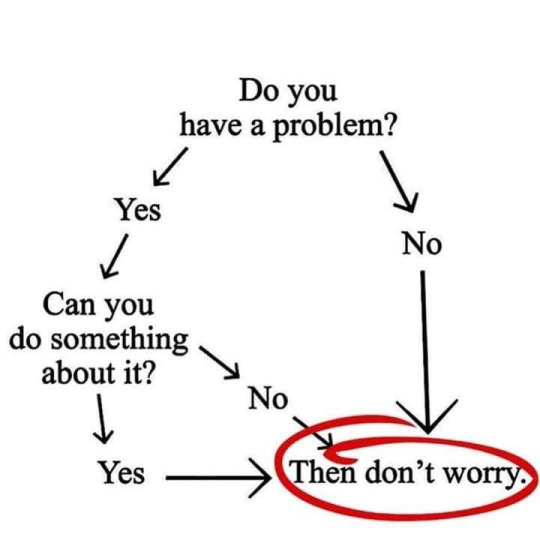
Now think about the same scenario. You see that your house is on fire. You think "Can I do something about it?"->"Yes. I can call the fire department." or "No. It is too late. Everything is turned to ash." In both cases, you don't have to worry because it is already done. You can't travel back in time so you have to create your plans for the future. You can't waste time thinking about the past because it will limit your capacity to act on the future.
If you use this perspective in every situation, eventually it will become automatic and your emotional reactions will not be as strong as it is now. This way, you will be able to use your logic more easily and solve the problem you have.(Or you will stop worrying if you don't have a problem.) This is probably the fundamental perspective of Stoicism.

3-Expressing Emotions
I won't go deep into the Jungian Shadow or deep psychology of the emotions and suppressing etc but we have to be aware of this fact: The fact that if you don't express your emotions in some way, it will come out later bigger than it was.(Also, you won't be in control.)
If you watched Elementary, you know that almost in every episode Sherlock express his emotions to Watson.(Or to someone else. Which by the way is a more human adaptation of Sherlock.)He talks with her about what he feels and thinks about the situation because he can't deal with them alone. We can't deal with them alone too so we have to find some ways to express them. Here are some basic ones:
1-Talking to your Watson
If you have someone you are close to, then talk to them. Explain your feelings and emotions as clear as you can be.
2-Keeping a Journal
You won't always have an opportunity to talk with somebody so you need to talk with yourself clearly, which is what journaling does. You use words and getting things out of your head so you can analyze them more clearly. Just write and then read them aloud.
3-Physicality
If you like to work out, run, go to the gym or do any physical activity, do it. It is especially useful for anger and sadness. Try and find whatever works for you.

So, that is a general look at emotions and how to live with them. After you read this, you won't immediately detach from your emotions and act with your logic. This post is not enough, so you have to do your own reading. Some suggestions for reading:
Meditations-Marcus Aurelius (Excellent example of journaling in a stoic way.)
The Handbook-Epictetus
Ryan Holiday's books(All relates to Stoicism)
And one last thing. Always remember these wise words:
"You have power over your mind, not outside events. Realize this and you will find strength."
-Marcus Aurelius
#deduction#sherlock holmes#bbc sherlock#deductive reasoning#sherlockbbc#sherlock#deductionist#observer#awareness#emotions#perspective#emotional#reflection#stoicism#seneca#philosophy#marcus aurelius#epictetus
21 notes
·
View notes
Text
Christmas deductions - whose wrapping paper is whose?
This post is coming a few days later than I intended, but it is still December! Inspired by @studies-in-the-art-of-deduction's post about deducing presents and @a-study-in-sepia's post deducing presents under her tree.
Each year, my parents randomly choose a different wrapping paper for the seven people in our house. For the past few years, my parents have had my siblings and I guess whose wrapping paper belongs to who - whoever gets the most correct gets to open the first gift. Not important to the post, but I did win this year, buuuut I only got 3 out of 7 of my guesses correct. For this post, I'm focusing on the 3 correct guesses and how I used observations/deductions to get those 3 right. I say both observations and deductions because I'm including information collected in the weeks leading up to Christmas and also physical examination/deducing of wrapped gifts.
--
I get Amazon package notifications on my phone as my family shares one account, and I saw a 3D printer pop up in November. I knew that my Dad had wanted one for years and had been collecting the plastic-y materials for 3D printing for years too. So that's his present: I know from this that one of the larger presents must be a 3D printer. But which box is his?
There were four larger presents - 3 different wrapping papers, with one wrapping paper being used twice.
Related to that, I remembered a conversation with my Mom in November - she had been excited about a present for Sibling Y and told me about it, referring to it as one of the presents in the stack of four large boxes. She then slipped and mentioned that the item was in two separate boxes. I now know Sibling Y's wrapping paper.
So I went to the other two large presents and picked both up: one was light and one was much heavier - 3D printers are heavy, so I know what my Dad's wrapping paper is. (Note: I double checked this deduction by looking at whether that wrapping paper had very few gifts, as my Dad typically has the fewest, and that wrapping paper did.)
With the last large present, I did not deduce correctly whose it was - but I know why I didn't so I'll explain.
Months ago, I was told how Sibling R's suitcase had been broken and how she would get a new one for Christmas. I forgot this conversation, because if I had remembered I would have known the final large box was a suitcase. Why did I not realize this when I picked the box up? Because of a conversation I remembered in November where my mom had told me she wasn't sure how I'd fly back to my place with my gifts. I swear she said that I had a gift or two that was too "big" but she told me post-Christmas that she had meant too heavy, not big. I had taken it as meaning my wrapping had to be the one the fourth large box was, since that was the only box left that would be too big for a suitcase - which is hilarious to me now because it literally was a suitcase. Oops. Lesson learned though: don't look at physical data through the lens of a conclusion you'd come to before looking at the physical data.
Those deductions were made through a combination of paying attention prior to Christmas and physical observations. The third wrapping paper that I deduced right was Sibling N's - I found two presents, deduced what was inside, and based on that knew which sibling that was.
Box #1: I shook this box and could hear a liquid sloshing around inside. In the weeks before Christmas, there had been a lot of talk of body sprays and perfumes from Siblings R and N. Based on how the sloshing sounded, this was not a perfume bottle, since the sloshing was too "big" if that makes sense - I could tell the bottle was bigger and there was more liquid than a perfume bottle. Sibling R uses perfumes and doesn't like body sprays, and Sibling N predominantly uses a body spray - so I deduced that this box had her specific brand of body spray. I marked the wrapping so when she opened it on Christmas day, I could confirm that I was right (I was).
Box #2: I picked up a few other boxes with the same wrapping as the body spray, looking for any indication of another gift Sibling N would be likely to get. One was a long (maybe a foot (or 2 hands length), rectangular box. I shook it and based on the sound I thought there was one item inside: similar shape to the box, long and rectangular. I deduced that this was a flat iron or curling iron of some kind, since several of my siblings, including Sibling N are always fighting over/stealing each other's flat irons. I confirmed this deduction on Christmas - she had gotten a flat iron.
I may make a second post that includes where I went wrong with the 4 incorrect guesses, but I will definitely do another post like this one next year - it was fun. :)
9 notes
·
View notes
Note
Greetings @amateur-deductions
What are your Go-to advice for for those who start becoming a deductionist and just finished learning body language?
Appreciate Your reply
Bless you all and have a good day.
Hello! Sorry for the delay, i've been on a hiatus since Christmas.
So if you're coming from having learned body language already you have a bit of a head start compared to people that are starting fresh, since you probably have already learned to be more observant, to be constantly aware of things like body movements and facial expressions, and to intepret these things and process them as you take them in. I would say this means you can put a bit less time into the observation practices beginners usually have to go through, and you can dedicate more time to practicing reasoning and logical thinking
I would also say you have the option to approach deduction using your body language background. Something you start to realize as you get better at deduction is that everyone has cultivated different skills they use to extract information, some people use raw logic reasoning, some use extensive psychology knowledge, and some use extensive knowledge in body language and facial expressions, and there's nothing wrong with any of these methods, they're simply what you could understand as different "specialties".
So i would advice that you don't try to learn deduction as a separate discipline than body language, but rather use your body language knowledge, coupled with anything you learn in the field of deduction, to enhance your conclusions
This does come with a disclaimer though. Make sure that you're not leaning into your body language knowledge so much that you're avoiding doing the exercises and learning the methods that are core to deduction simply because body language provides an easier path, since you're well versed in that already
#deduce#learning deduction#deductionist#deductive reasoning#deduction#sherlock#logic reasoning#observant#observation#profiling#psychology#logic#sherlock holmes#bbc sherlock#sherlock bbc#Sherlockian Deduction#How to think like Sherlock Holmes#study#studyblr#learning#tips#memory#mind palace#microexpressions#criminal minds#the mentalist#house md#elementary#body language#answers
12 notes
·
View notes